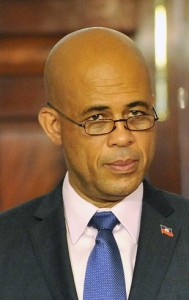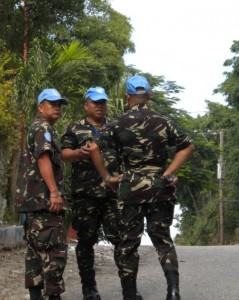Tag: minustah
In the News: Martelly to Haitians in South Florida: ‘Haiti has changed a lot’
by Jacqueline Charles and Nadege Green, The Miami Herald, Dec. 10, 2012
 Haitian President Michel Martelly said Monday he plans to introduce an amendment in parliament giving millions of Haitians living in the diaspora, including South Florida, the right to vote in future elections. “Of course it will be up to the parliament to decide if it goes through,” Martelly said during a press conference Monday after an all-day invitation-only diaspora forum with members of the Haitian-American community at the North Miami Beach Library.
Haitian President Michel Martelly said Monday he plans to introduce an amendment in parliament giving millions of Haitians living in the diaspora, including South Florida, the right to vote in future elections. “Of course it will be up to the parliament to decide if it goes through,” Martelly said during a press conference Monday after an all-day invitation-only diaspora forum with members of the Haitian-American community at the North Miami Beach Library.
Martelly arrived in Miami over the weekend after a tour of Japan. He said he proposed the South Florida visit and the meeting with the Haitian community “to first of all thank the diaspora for their support” during his historical 2011 presidential victory and “to inform them on the progress in Haiti and finally to find a way to engage them to help us really develop Haiti.”
“I believe there is more that can be done by the diaspora,” he said. “But before we even ask for anything, I thought it was very important that we come here to not just tell them what we do, but also show them.”
Continue reading In the News: Martelly to Haitians in South Florida: ‘Haiti has changed a lot’
In the News: UN must make amends for cholera that organization brought to Haiti
Editorial, Boston Globe, November 13, 2012
 When the international aid community descends on a vulnerable place, the first objective must be to do no harm. But all too often, good intentions make a bad situation even worse. That’s what happened two years ago, when United Nations peacekeepers arrived in Haiti in the wake of a devastating earthquake, bringing the deadly disease cholera with them.
When the international aid community descends on a vulnerable place, the first objective must be to do no harm. But all too often, good intentions make a bad situation even worse. That’s what happened two years ago, when United Nations peacekeepers arrived in Haiti in the wake of a devastating earthquake, bringing the deadly disease cholera with them.
Last year, a panel of UN experts concluded that poor sanitation at the peacekeepers’ camp was the likely cause of a terrible cholera outbreak that has so far killed 7,000 people and sickened 500,000. Their report declined to say whether the peacekeepers, the sanitation contractor, or the UN’s own inadequate health protocols were to blame for human waste getting into Haiti’s water supply. But as cholera deaths continue, new scientific evidence removes all doubt about the source of the disease: The strain of cholera that exploded in Haiti is an exact match to the cholera that exists in Nepal, the UN peacekeepers’ native country.
Continue reading In the News: UN must make amends for cholera that organization brought to Haiti
In the News: International Delegation Challenges UN Officials on Renewal of Haiti Occupation
UN Official Suggests that Troops May Stay Until 2015
by Kim Ives, published in Haiti Liberte, Oct 17, 2012
 On October 12, the United Nations Security Council voted unanimously to renew for one more year the foreign military occupation of Haiti known as the UN Mission to Stabilize Haiti, or MINUSTAH, which has been deployed in Haiti since June 1, 2004.
On October 12, the United Nations Security Council voted unanimously to renew for one more year the foreign military occupation of Haiti known as the UN Mission to Stabilize Haiti, or MINUSTAH, which has been deployed in Haiti since June 1, 2004.
However, the Haitian people, and increasingly people throughout Latin America, are calling for UN troops to immediately leave Haiti and respect Haiti’s sovereignty and right to self-determination. This was the message of an international delegation led by Haitian Senator Moïse Jean-Charles which met for almost two hours with high-ranking UN officials on Oct. 11, the day before the vote.
The 10-member delegation, composed of unionists, activists, and journalists, met with William Gardner, the Senior Political Affairs Officer of UN Department of Peace-Keeping Operations’ Europe and Latin America Division, and three of his Political Affairs Officers, Patrick Hein, Ekaterina Pischalnikova, and Nedialko Kostov.
Sen. Moïse’s delegation included Julio Turra, National Executive Director of the United Trade Union Central of Workers of Brazil (CUT); Pablo Micheli, General Secretary of the Confederation of Workers of Argentina (CTA); Fignolé St. Cyr, General Secretary of the Autonomous Confederation of Haitian Workers (CATH); Jocelyn Lapitre, a leader with the Front against Profit (LKP) in Guadeloupe; Colia Clark of the Guadeloupe-Haiti Campaign Committee; Alan Benjamin of the International Liaison Committee of Workers and Peoples (ILC); Robert Garoute, of the Progressive Movement for Haiti’s Development (MPDH); Geffrard Jude Joseph, the director of Radio Panou; and Kim Ives, a journalist with Haiti Liberté newspaper.
In the News: Signs Point toward Controversial Renewal of MINUSTAH’s Mandate in Haiti
by Kevin Edmonds, NACLA
According to a report released on August 31 by Secretary-General Ban Ki Moon regarding the United Nations Mission for Stabilization in Haiti (MINUSTAH by its French acronym), it appears that the renewal of the highly controversial mission will occur once again without any meaningful debate. Moon’s report effectively acts as a rubber stamp of approval for the occupation, stating that he was “Reaffirming my commitment to continue to focus the activities of the Mission, I recommend that the Security Council extend its mandate of one year, until 15 October 2013.”
 MINUSTAH’s reputation and credibility as a stabilizing force has been shattered since the introduction of cholera into the island by the negligence of both the troops and shoddy base infrastructure in October 2010. Up until the deployment of Nepalese troops in the Artibonite Valley that October, Haiti had never experienced a cholera outbreak. According to the latest figures, the cholera epidemic has killed over 7,500 people, infecting another 590,000.
MINUSTAH’s reputation and credibility as a stabilizing force has been shattered since the introduction of cholera into the island by the negligence of both the troops and shoddy base infrastructure in October 2010. Up until the deployment of Nepalese troops in the Artibonite Valley that October, Haiti had never experienced a cholera outbreak. According to the latest figures, the cholera epidemic has killed over 7,500 people, infecting another 590,000.
To date, the United Nations has refused to take responsibility for their role in the epidemic, despite “irrefutable molecular evidence” that the Haitian strain was virtually identical to the Nepalese strain. Reports from American medical researchers at the Center for Disease Control, in addition to separate French and Danish teams, have all confirmed that the MINUSTAH base in Mirebalais was the source of the cholera strain.
In the News: The UN’s Cholera Epidemic in Haiti
by Mark Weisbrot
Originally published in CounterPunch
Haitians have had a long and arduous struggle just to achieve the rights that most people in the rest of the hemisphere have enjoyed. From the revolution of Haitian slaves that won independence from the French in 1804, through the U.S. occupation (1915-1934), the Duvalier family dictatorship (1957-1986), and the last 20 years of devastating foreign intervention, the “international community” just hasn’t seen Haitians as having the same basic human rights as people in other countries.
They still don’t, perhaps because Haitians are too poor and black. While the horrific earthquake of January 2010 brought international sympathy and aid – much more pledged than delivered – it didn’t bring a change of attitude toward Haiti.
Continue reading In the News: The UN’s Cholera Epidemic in Haiti
